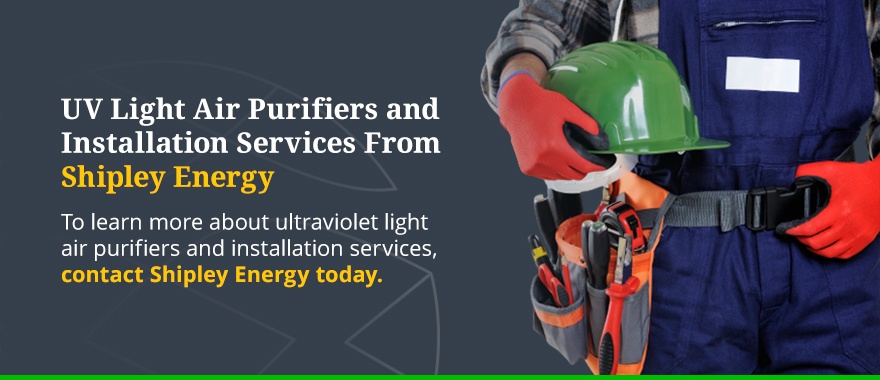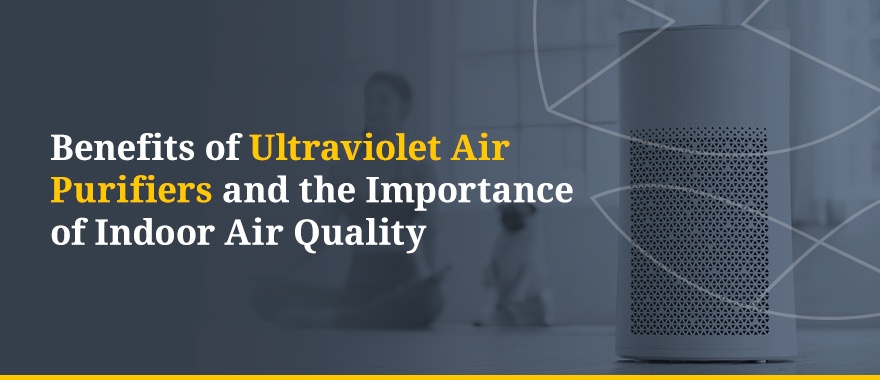

Things that make you sick can be challenging to fight, as they’re too small to see or feel. Pathogens like bacteria, viruses, and mold spores can lead to all kinds of health concerns, but you’re often unaware that you’re breathing them in. While you may think staying inside will help you avoid sickness, indoor air contaminants can be as dangerous as the ones outside. It’s difficult to know when air is polluted, so it’s important to take precautions.
For better indoor air quality, you might consider using an air-cleaning device like an ultraviolet (UV) air purifier. These devices attack the pathogens that cause illness and produce safer air for you to breathe. They also improve the efficiency of your ventilation system by keeping it from getting clogged. This guide covers everything you need to know about ultraviolet air purifiers — what they are, how they work, and their benefits.
A UV air purifier uses ultraviolet light waves to target or “inactivate” airborne germs. Both pathogens and ultraviolet light are invisible to the human eye. Although it may seem small-scale, it can have huge impacts. Air purification promotes health and improves heating, ventilation, and air conditioning (HVAC) efficiency.
One of these devices can be standalone, or it can be integrated into an HVAC system. It attacks viruses, bacteria, mold, mildew, and fungi so the air you breathe is safer. Learn about the science behind these air purifying devices.
As air passes through an ultraviolet light air purifier, short-wave ultraviolet light waves inactivate pollutants. The term “inactivate” refers to the breaking down of the pathogens’ Deoxyribonucleic Acid (DNA) or Ribonucleic Acid (RNA). This makes them unable to function or reproduce.
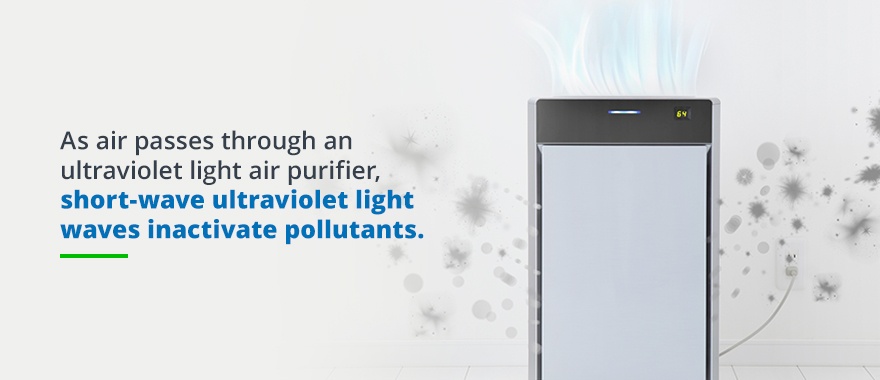
The device forces air in and exposes pathogens to ultraviolet light long enough to corrupt their DNA or RNA. A pathogen has to be close to the ultraviolet light source where it’s exposed for at least a few seconds. This allows the damage to take effect. An ultraviolet air purifier also includes a special filter to contain pathogens longer.
Though you cannot feel or see ultraviolet light, it has a lot of energy. The shorter the wavelength of light, the faster it vibrates. Ultraviolet light has a shorter, faster wavelength than visible light. Visible light has wavelengths of 400-700 nanometers, while UV light has wavelengths of less than 400 nanometers. Its quick vibration produces a great deal of energy.
If you’ve ever had a sunburn, you’ve experienced the effects of ultraviolet light. The sun gives off a certain type of ultraviolet light that damages the DNA in your skin, causing it to inflame and appear red. As a multi-cell organism, you can survive this damage. It might be painful and annoying, but it takes a lot for a sunburn to be life-threatening. However, a lot of exposure over several years can lead to skin cancer. This is why you should wear sunscreen when the UV index is high, even if your skin tends not to burn.
The scenario is different, however, for a single-cell organism, like a bacterium or virus. Unlike your body, a single-cell body does not have the luxury of replacing damaged cells. When ultraviolet light impacts the DNA of a single-cell organism, it can no longer function — reproduction becomes impossible. Rapid reproduction is what makes germs so dangerous, so ultraviolet light purifiers make the air much safer.
Keep in mind that some ultraviolet air purifiers produce ozone. The light waves can cause oxygen to break apart and recombine as ozone, which can damage the lungs if you breathe it in. If you’re looking to install an air purification device, make sure this issue is addressed. For instance, some air purifying devices use ions to remove hydrogen molecules from pathogens. This kills the pathogens without the risk of producing ozone.
It’s easy to underestimate the importance of indoor air quality since it’s an invisible problem. Though indoor air quality is often overlooked, the Environmental Protection Agency (EPA) ranks it as one of the top five environmental risks to public health. Think about how much indoor air you breathe every single day.
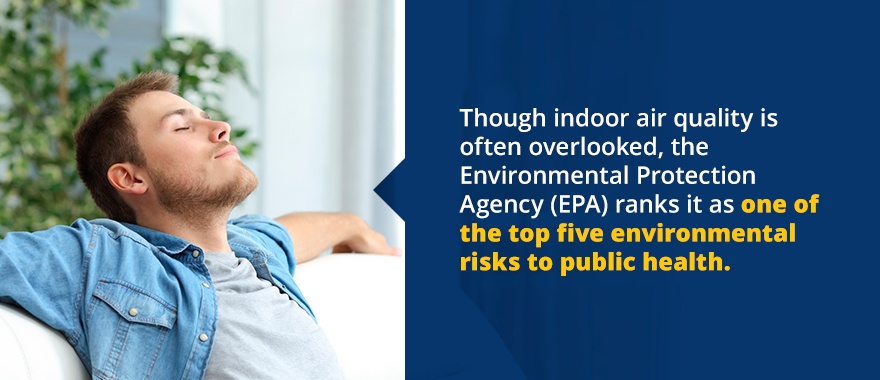
You might spend more time inside than you realize — the average American spends about 90% of their time indoors. This number can be even higher for young children and the elderly. We spend a lot of time breathing indoor air.
When we think of air pollution, we might only think of outdoor issues, such as smog from factories and exhaust from cars. While outdoor air pollutants can be dangerous, the air in our homes and buildings can be as well. Indoor air can contain a lot more pathogens than outdoor air. The concentration of some pollutants is two to five times higher indoors than it is outdoors.
Particles that pollute outdoor air can invade a home or building through open doors and windows or tiny cracks between them. Additionally, indoor environments can produce pollutants like dust mites, pet dander, and mold. Floors and furniture can release chemicals called volatile organic compounds (VOCs), which can be hazardous. When it comes to bacteria and viruses, humidity and warmth allow them to thrive.
As you can guess, indoor air pollutants take many forms, and their numbers can skyrocket throughout a home or building. Organic pollutants like bacteria, viruses, and mold are especially dangerous because they continually reproduce. Contaminated indoor air can cause many health concerns.
If a home, workplace, school, or other building has no air purification system in place, its occupants will breathe in a lot of pathogens. This can cause temporary illness as well as permanent damage. Breathing contaminated air can have many negative effects, including sickness and respiratory issues. Long-term exposure can increase the risk of heart disease or cancer. Some other effects of poor indoor air quality include:
Dangers like these are especially concerning for those with pre-existing asthma, allergies, respiratory issues, suppressed immune systems, or heart disease. Though some are more sensitive to air contaminants, even the healthiest people can suffer their negative effects.
Such health risks make air purifiers a necessity. Poor indoor air quality leads to wellness concerns, which in turn have other effects. If employees get sick from the air they breathe at work, they may not be able to perform their job duties to the best of their ability.
Similarly, if students get sick from the air they breathe at school, their concentration will suffer and they’ll miss school more often. If guests or patrons get sick in a particular building, they may take their business elsewhere — for instance, guests of a hotel who develop a cold after their stay may seek a different hotel in the future.
To avoid the health and safety issues associated with poor indoor air quality, use an air purification device.
The benefits of installing a commercial air cleaner are important to recognize. In addition to decreasing the risk of illness, they increase HVAC efficiency and reduce maintenance costs. Here are some of the benefits of commercial air purifiers.
Breathing safer air promotes the health and comfort of everyone in your building. This is important in and of itself, but it also generates other positive effects. Think about the benefits of clean air in your building.
If your building has safe, uncontaminated air, you’ll have a more effective and focused workforce.
Additionally, cleaner air means any patrons or guests will have a more positive experience. If a patron notices allergy flare-ups in your building, they might choose not to return. Air purification in commercial settings snowballs into several positive outcomes.
If contaminants are clogging your HVAC system, it’ll have to work harder to heat or cool your building. With an air purification device in place, your HVAC’s airflow will be smoother and more efficient, decreasing your energy consumption. This can make your building more environmentally friendly and lower your monthly energy bills. You’ll be able to keep your building warm or cool while using less energy.
Smoother HVAC operation also contributes to comfort and productivity. The faster your building heats or cools, the sooner its occupants will feel comfortable. In cold or hot temperatures, employees may be more focused on warming up or cooling off than they are on their job duties.
You’ll also improve the experiences of your guests or patrons by providing them with a comfortable building temperature. If contaminants are clogging your system, it may take a long time to achieve a stable temperature.
Purification devices help an HVAC system run efficiently. They do so by trapping the contaminants that would become clogged in your HVAC’s filters. A purifier improves airflow and decreases HVAC maintenance costs. You can actually prolong the lifespan of your entire HVAC system by installing an air purifying device.
You may want to install an ultraviolet air purifier in your home. Along with other air quality control systems — such as humidity controllers and filtration units — an ultraviolet purifier can help you breathe safer air in your home. Consider the benefits of installing a whole-house air cleaner.
Removing pathogens from the air in your home can reduce your chance of falling ill. It can also have other positive effects on your home. These are some of the benefits of installing HVAC ultraviolet lights in the home.
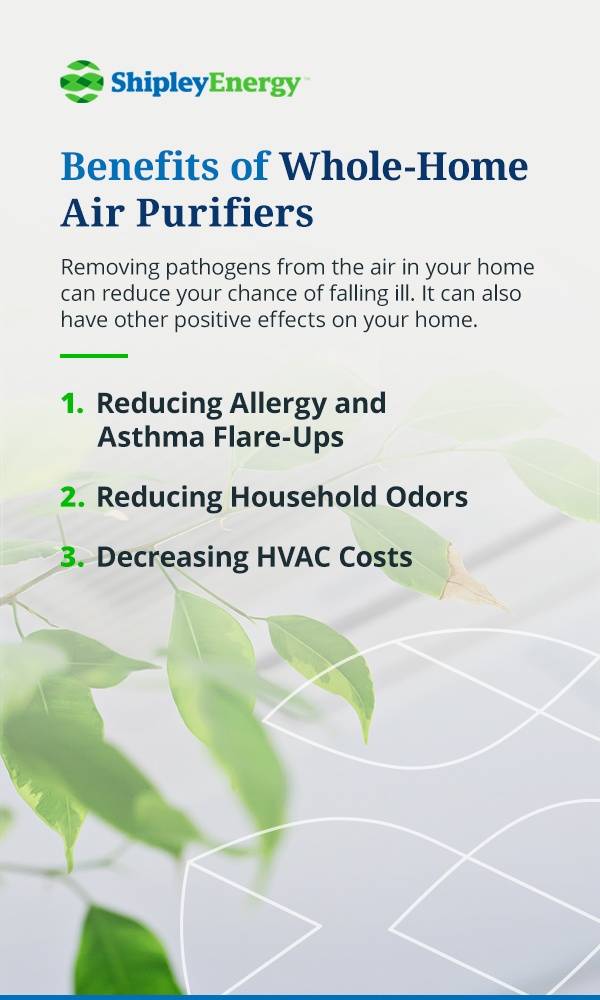
With fewer dust particles, pet dander, and pathogens in the air, you’ll see a reduction in allergy and asthma-related symptoms. Unclean air can cause flare-ups of existing allergies or respiratory issues.
Removing airborne particles can help control household odors. Having an air purification system can make your home smell fresher and cleaner. When you have a whole-home air purifier, odors associated with cooking, cleaning, pets, and messes can dissipate faster.
As with a commercial system, an ultraviolet air purifier can improve the efficiency of your home HVAC system and prolong its lifespan. This can help decrease HVAC-related costs, although there are many benefits of an ultraviolet air purifier on your HVAC system.
Ultraviolet air purifiers do more than promote health and safety. These devices can actually improve the functionality of your HVAC system. The benefits of UV light in HVAC systems include:
You may choose to install an ultraviolet air purifier for the health benefits alone. But these devices are helpful in many other ways, as well. They can help your heating and cooling units to run more efficiently, reduce maintenance costs and help to extend the overall life of your units.
With an ultraviolet air purifier keeping your HVAC system clean and unclogged, you’ll be able to spend your money on other, equally important expenses.
If you want to reap all of an ultraviolet air purifier’s benefits, it’s critical to invest in professional installation. A qualified technician will decide where and how to install ultraviolet lights. This is important, as an expert will ensure safe placement.
To learn more about ultraviolet light air purifiers and installation services, contact Shipley Energy today. At Shipley Energy, we specialize in all types of commercial and residential energy systems. We can answer all your questions and help you meet your energy needs.
